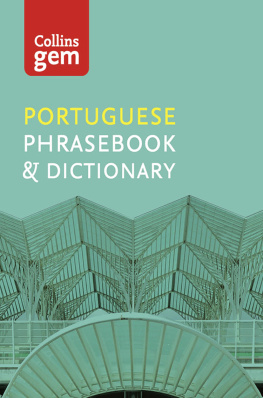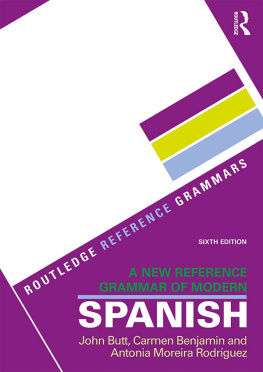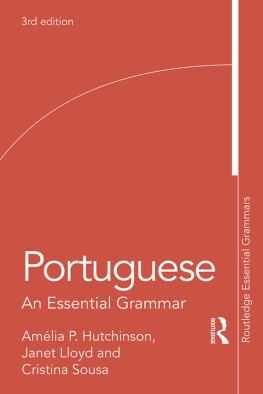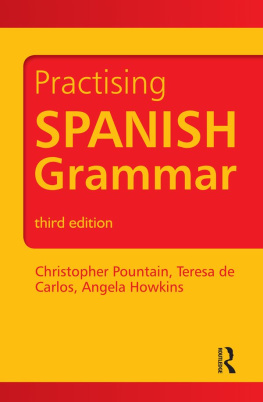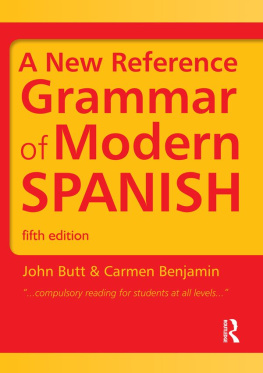Comparative Grammar of Spanish and Portuguese Learn and Compare 2 LanguagesSimultaneously With Useful Phrases to Survive a Conversation MIKHAIL PETRUNIN MIKHAIL PETRUNIN Copyright 2018 Mikhail Petrunin All rights reserved. !ii COMPARATIVE GRAMMAR OF SPANISH AND PORTUGUESE To all Hispanophiles and Lusophiles of the world. !iii MIKHAIL PETRUNIN !iv COMPARATIVE GRAMMAR OF SPANISH AND PORTUGUESE CONTENTS Preface To the Learner xix
Acknowledgements
xxv
Symbols xxvi
Part I: Grammar
1
Introduction: Alphabet
Letter names and Pronunciations Digraphs Diacritics Diphthongs Chapter 1: Nouns
Gender of Nouns Forming the Feminine
Plural Forms of Nouns Special Cases of Forming the Plural Nouns Nouns which are always Plural Nouns which are always Singular Chapter 2: Adjectives
Gender of Adjectives Forming the Feminine
Plural Forms of AdjectivesPeculiarities of Adjective Use Chapter 3: Adverbs
Use of Adverbs !v MIKHAIL PETRUNIN
Forming Adverbs from Adjectives. Adverbs Ending in-mente (-ment)Other Adverbs Adverbs of manner Adverbs of place Adverbs of time Adverbs of intensity Adverbs of doubt Adverbs expressing affirmation Adverbs expressing exclusion Adverbs composed of several words Adverbial phrases
Position of AdverbsComparison of Adjectives and AdverbsIrregular Comparatives and Superlatives Chapter 4: Articles
Origin of Articles in Romance Languages. Definiteand Indefinite Articles. Gender Spanish and Portuguese
Use of the Article General Use of the Indefinite Article General Use of the Definite Article Omission of the Definite Article Omission of the Article
The Neuter Article lo in SpanishContraction of the Article Chapter 5: Pronouns
Personal Pronouns !vi COMPARATIVE GRAMMAR OF SPANISH AND PORTUGUESE
Subject Pronouns Overview Use of Subject Pronouns Omission of Subject Pronouns
Direct Object Use of Direct Object Pronouns Word Order of Direct Object Pronouns Divergent Aspects in Word Order Different Variants of Direct Object in Portuguese
Indirect Object Use of Indirect Object Pronouns Common Verbs Used with an Indirect Object in Romance Languages Word Order of Indirect Object Pronouns
Contraction. acabar de; Port. acabar de + The Infinitive The Preterite Formation of the Preterite Irregular Verbs in the Preterite Irregularities in Formation the Preterite Use of the Preterite Difference between the Preterite and the Present Perfect in the Romance languages Asking Questions Peculiarities of Interrogation in the Romance languages Negation Formation of Negation in Simple Tenses Negation of the Infinitive !ix MIKHAIL PETRUNIN Negation with Adjectives and the Adverb Very Formation of Negation in Compound Tenses Other Negative Expressions The Imperfect Tense Formation of the Imperfect Irregular Verbs in the Imperfect Use of the Imperfect Sp. desde hace; Port. desde + The Imperfect Tense Difference between the Preterite and the Imperfect in the Romance Languages Compound Tenses in The Past Overview The Pluperfect Tense Formation of the Pluperfect Use of the Pluperfect Tense Peculiarities of Use of the Pluperfect in the Romance Languages Irregular Verbs of the Pluperfect in Portuguese The Past Perfect (Anterior) Tense Formation of The Past Perfect (Anterior) Use of the Past Perfect (Anterior) Tense The Future Tense Regular Formation of the Future Irregular Verbs in The Future Use of The Future Tense The Informal Future Special Use of the Future The Future Perfect Tense !x COMPARATIVE GRAMMAR OF SPANISH AND PORTUGUESE Formation of the Future Perfect Use of the Future Perfect Tense Special Use of the Future Perfect The Conditional Tense Overview Formation of the Present Conditional Irregular Verbs in the Conditional Use of the Conditional Tense The Conditional Perfect Tense Overview Formation of the Conditional Perfect Use of the Conditional Perfect Tense Conditional Clauses The Subjunctive Mood Overview Basic Rules for Indicative and Subjunctive The Present Subjunctive Formation of the Present Subjunctive Irregular Verbs in the Present Subjunctive Use of the Present Subjunctive Sp. desde + The Imperfect Tense Difference between the Preterite and the Imperfect in the Romance Languages Compound Tenses in The Past Overview The Pluperfect Tense Formation of the Pluperfect Use of the Pluperfect Tense Peculiarities of Use of the Pluperfect in the Romance Languages Irregular Verbs of the Pluperfect in Portuguese The Past Perfect (Anterior) Tense Formation of The Past Perfect (Anterior) Use of the Past Perfect (Anterior) Tense The Future Tense Regular Formation of the Future Irregular Verbs in The Future Use of The Future Tense The Informal Future Special Use of the Future The Future Perfect Tense !x COMPARATIVE GRAMMAR OF SPANISH AND PORTUGUESE Formation of the Future Perfect Use of the Future Perfect Tense Special Use of the Future Perfect The Conditional Tense Overview Formation of the Present Conditional Irregular Verbs in the Conditional Use of the Conditional Tense The Conditional Perfect Tense Overview Formation of the Conditional Perfect Use of the Conditional Perfect Tense Conditional Clauses The Subjunctive Mood Overview Basic Rules for Indicative and Subjunctive The Present Subjunctive Formation of the Present Subjunctive Irregular Verbs in the Present Subjunctive Use of the Present Subjunctive Sp.
Ojal (que) Use of the Present Indicative instead of Subjunctive Subjunctive with Subordinate Conjunctions Indirect Commands in Romance languages Subjunctive after Affirmation in Romance Languages Subjunctive in Relative Clauses Indicative with the Superlative Subjunctive with Indefinite Words !xi MIKHAIL PETRUNIN The Present Perfect Subjunctive Formation of the Present Perfect Subjunctive Use of the Present Perfect Subjunctive The Imperfect Subjunctive Formation of the Imperfect Subjunctive Irregular Verbs in the Imperfect Subjunctive Use of the Imperfect Subjunctive The Pluperfect (Past Perfect) Subjunctive Overview Formation of The Pluperfect Subjunctive Use of the Pluperfect Subjunctive The Future Subjunctive in Spanish and Portuguese Overview Formation of the Future Subjunctive Irregular verbs in the Future Subjunctive Use of The Future Subjunctive The Future Perfect Subjunctive Overview Formation of the Future Perfect Subjunctive Use of The Future Perfect Subjunctive The Sequence of Tenses with the SubjunctiveThe Imperative Mood Spanish and Portuguese Lets Commands with the Verb Ir Irregular Imperative The Negative Imperative Softened Commands in the Romance Languages The Present Participle (Gerund) !xii COMPARATIVE GRAMMAR OF SPANISH AND PORTUGUESE Overview Formation of the Present Participle (Gerund) Irregularities in Formation of the Present Participle (Gerund) in Spanish and Italian Use of Present Participle (Gerund) No Use of Present Participle (Gerund) How to Avoid Using the Present Participle (Gerund) The Compound Present Participle (Gerund) inPortuguese and Italian Formation of the Compound Present Participle (Gerund) in Portuguese and Italian Use of the Compound Present Participle in Portuguese and Italian The Continuous Tenses Formation of Continuous Tenses Use of Continuous Tenses The Present Continuous The Imperfect Continuous The Infinitive Overview Use of The Infinitive Spanish al + Infinitive Make in Causative Constructions in The RomanceLanguagesLet and Verbs of Perception + the Infinitive in theRomance LanguagesThe Compound Infinitive Use of the Compound Infinitive Portuguese Personal Infinitive Overview !xiii MIKHAIL PETRUNIN Forms of the Personal Infinitive Use of Portuguese Personal Infinitive Reflexive Verbs Overview Formation of Reflexive Verbs Reflexive Verbs with a Reflexive Meaning Reflexive Verbs with Parts of the Body Reciprocal Reflexive Verbs Reflexive Verbs Versus Non-Reflexive Verbs Reflexive Verbs in the Infinitive in the Romance languages Reflexive
Next page




